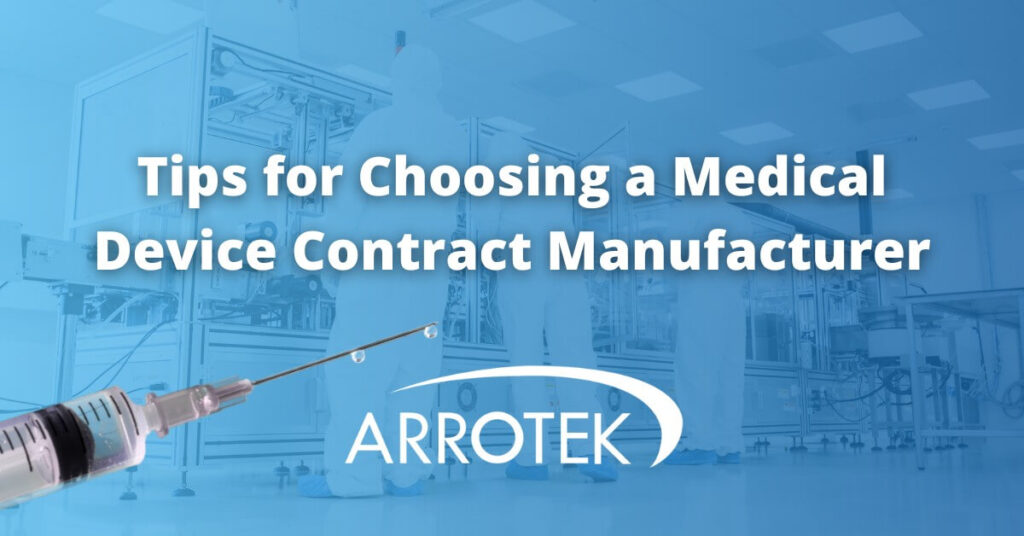From global medical device corporations to innovative start-ups, there is a growing trend to outsource medical device manufacturing. Outsourcing to a medical device contract manufacturer brings a range of benefits, but how do you ensure you select the right company?
The following 12 points are essential areas you should consider when choosing a medical device contract manufacturing partner.
1. Consider Your Reasons for Hiring a Contract Manufacturer
The best starting point is typically to clarify and define why you want to hire a contract manufacturer. Some common reasons include:
- Switch to a new contract manufacturer
- Simplify the manufacturing process of your medical device
- Reduce manufacturing costs, risks, and/or complexity
- To scale up manufacturing
- Re-focus the business on priority areas such as R&D, marketing, or distribution
- Improve speed to market
2. Start Early
It is also important to start looking for a medical device contract manufacturer as early as possible, as this helps bring DFM (Design for Manufacturing) into the early stages of the process. The benefits include:
- Prevent the need to rework elements later in the process to make them fit with manufacturing realities
- Minimize costs because issues can be dealt with early without double-work
- Improved supply chain management
- Reduced time to market
Bringing a contract manufacturer into the process early also involves sharing as much information as soon as possible. When doing this, use an NDA to protect your IP and commercial interests.
3. Choose a Contract Manufacturer that Offers an End-to-end Service
The simplest and most cost-effective approach when outsourcing to a medical device contract manufacturer is to have a single partner. This means hiring a company that offers an end-to-end service across the full product lifecycle.
Examples of the services your contract manufacturer should offer include medical device design, prototyping, regulatory, validation, verification, manufacturing, quality management, assembly, and packaging.
4. Focus on DFM and DFA
DFM and DFA (Design for Assembly) are essential processes to ensure your medical device can be manufactured according to the targets you have set, particularly in relation to target manufacturing costs.
The contract manufacturer you choose should have expertise in both DFM and DFA to ensure it can properly address the challenges of producing your product.
5. Check the Contract Manufacturer Has the Right Experience and Expertise
Medical device manufacturing experience and expertise are essential, but you should also dig deeper as not all medical device contract manufacturers are the same. Some questions you could ask include:
- Does the manufacturer have experience producing medical devices that are as complex or innovative as yours?
- Do they have knowledge and experience of the technologies that are required?
- Do they have sufficient materials knowledge, particularly in relation to the performance requirements of your medical device?
- Do they offer the manufacturing methods that will be needed to produce your product, keeping in mind that multiple production methods are likely to be needed? For example, if your product has a handle, it will be manufactured using different materials and methods than the sharp end of the device.
- Do they have a thorough understanding of medical device classifications, as the compliance protocols for Class I, II, and III medical devices are different? Do they have direct experience manufacturing products that are classified the same as yours?
- Is the manufacturer FDA registered?
- Do they have knowledge of other regulatory markets, including in the European Union?
6. Check the Contract Manufacturer Has the Right Machines and Equipment
You should also confirm the contract manufacturer has the capability to produce your product. For example, does the company have the molding, machining, milling, turning, cutting, grinding, or laser processing machines that are required? Does it have the capacity and is its facility up to the required standard, particularly in relation to cleanroom facilities?
7. Ensure Manufacturing Efficiency
Manufacturing technologies and processes are rapidly changing with the introduction of Industry 4.0 and smart manufacturing technologies. These modern manufacturing methods offer a range of benefits, including reducing costs, improving access to data, enhancing traceability, and making regulatory compliance more efficient.
Therefore, it is helpful to find out how the contract manufacturer will ensure efficiency in the production of your medical device.
8. Focus on Quality
- Does the manufacturer have sufficient quality expertise and a proven track record?
- Do they have knowledge and experience of FDA and ISO 13485 compliance? ISO 13485 compliance demonstrates the contract manufacturer’s Quality Management System is certified to medical device manufacturing standards.
- What is the company’s quality policy and what is its approach? For example, does it practice real-time process control and use lean manufacturing methods?
9. Check the Contract Manufacturer’s Supply Chain Management Processes
Materials account for a significant proportion of the costs involved in manufacturing medical devices, so the supply chain is going to be crucial to your product’s success. It makes sense, therefore, to check the contract manufacturer’s supply chain processes.
For example, how robust is the company’s material requirement planning system, and what is its approach to vendor quality control?
10. Continuous Improvement and Investment Are Important
The medical device industry never stands still, so it is important the contract manufacturer you choose continuously invests in its equipment, machines, processes, facilities, and skills.
It is also important to ensure there will be continuous improvement in the manufacture of your product, as your contract manufacturer should be constantly seeking to find improvements in areas like cost, quality, and throughput.
11. Find Out About Lead Times
Finding out about immediate production lead times is common, but it is also important to think about future lead times. Do those future lead times ensure production can scale with the requirements of your business?
12. Prioritize Developing a Partnership
Manufacturing medical devices is unlike manufacturing most other products, not least because of compliance requirements and safety considerations.
Therefore, the relationship you have with a contract manufacturer should be more than a straightforward client-supplier relationship. Instead, you should develop a partnership where the relationship is based on shared goals, values, and visions for the future.
Making Your Choice
The final point above explains our approach at Arrotek. We offer an end-to-end service with extensive expertise in medical device manufacturing and supporting our clients across the entire product lifecycle. To speak to a member of our team about your medical device contract manufacturing requirements, please get in touch.





